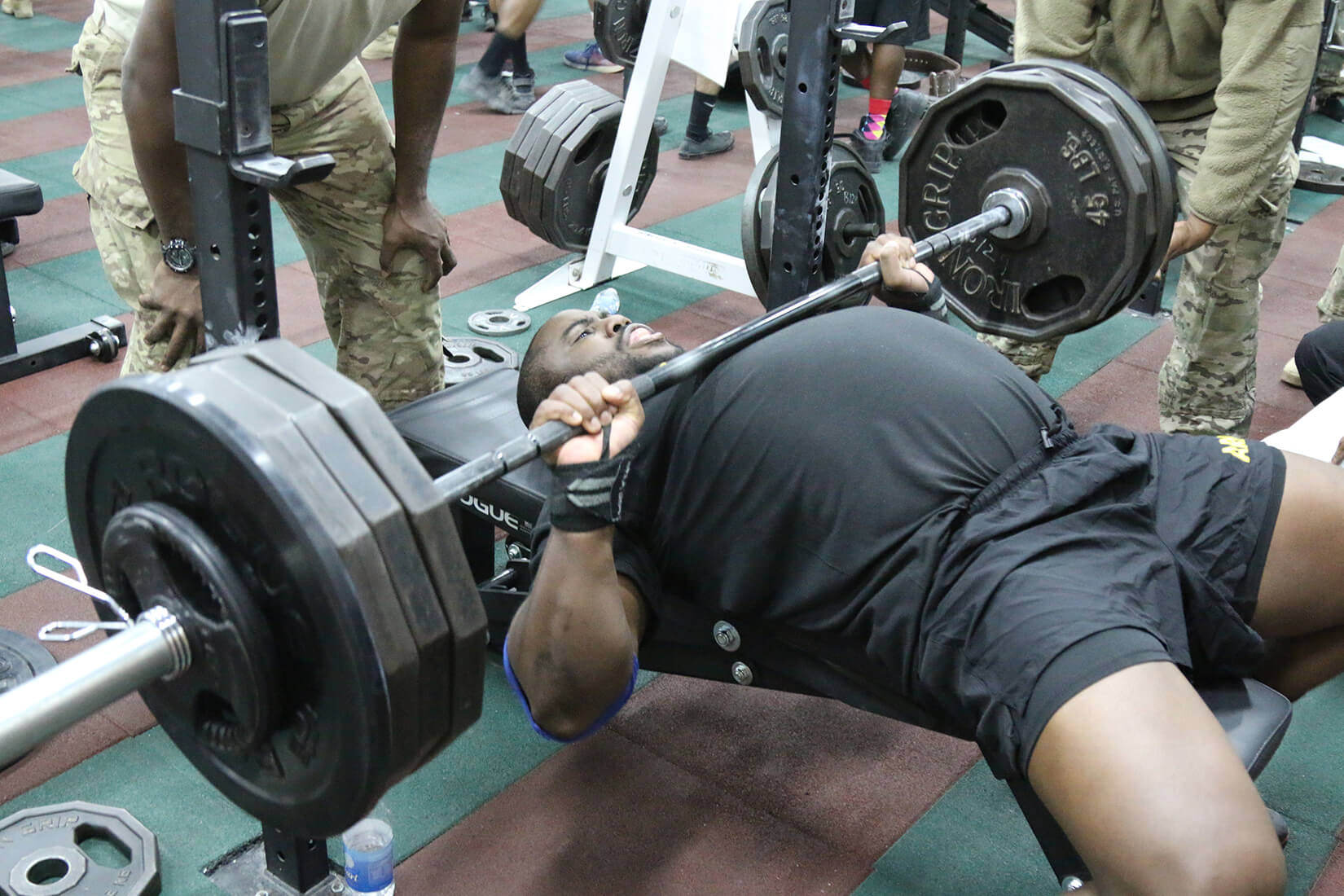
powerlifting competition at Camp Taji, Iraq, earlier this year. Authors of a new study question the
safety of such competitions because of injury potential.
Army photo by 1st Lt. Darren T. Herring Jr.
ST. LOUIS — Lifting weights is one way servicemembers keep in peak physical condition during deployment. A new study suggests, however, that the intense workouts might be too much of a good thing.
A report in Journal of Orthopedics and Rheumatology discussed the “alarming frequency” of serious chest muscle injuries among military personnel who lift weights during deployment. Specifically, the article pointed to tears of the pectoralis major tendon which occurred during bench press weight training. Surgical repair and six months recovery usually are required in the aftermath, the study said.
The study was led by Dane Salazar, MD, a former Air Force orthopedic surgeon, who was at St. Louis University School of Medicine and now is associated with Loyola Medicine in Mayfield, IL, and Air Force orthopedic surgeon W. Steven Choate, MD, of the Air Force Center for Sustainment of Trauma and Readiness Skills (C-STARS) at the University of Maryland.
The researchers became concerned when they treated nine active-duty soldiers and airmen for pectoralis tears during only four months at a hospital in a forward deployed location. All were injured while doing bench press weight training, with weights ranging from 135 pounds to 415 pounds, with an average of 258 pounds. The servicemembers average age was 32, although some were as old as 52, and three were officers.
The study noted that the injury is so rare among civilians that shoulder-and-elbow surgeons often treat an average of less than one pectoralis tear a year.
Deployed active duty personnel, on the other hand, “likely represent a high-risk population for this injury,” study authors wrote. “Future studies designed to identify the true incidence, report long-term outcomes and investigate modifiable patient risk factors in this population are warranted.”
The researchers pointed out that, as “sport related activities and weight training broaden in popularity, the incidence of pectoralis major tears appears to be increasing.” They sought to report on the causes of a series of acute pectoralis major tears in active duty deployed military personnel, while identifying any patient-specific risk factors and confirming that in-theater surgical repair is possible in most cases.
To do that, the study team conducted a retrospective analysis of the medical records and imaging of the nine cases of acute pectoralis major tears evaluated and treated by the deployed military orthopedic surgeons at one expeditionary medical treatment facility (MTF). The study was conducted over a four-month deployment cycle from December 2013 through March 2014.
Of the nine male patients, seven had complete tears at the tendinous insertion (Tietjen Type III-D), one had complete tear at the musculotendinous junction (Tietjen Type III-C), and one had incomplete tear (Tietjen Type II). The dominant upper extremity was involved in the bench press workout 56% of the time.
The study also stated that mean length of deployment was 230 days (120-365), with injury occurring an average of 77 days into the tour (3-198 days). Mean time from injury to surgical repair in the cohort was 18 days (10-43).
“Due to the alarming frequency with which pectoralis major ruptures were diagnosed and treated at one expeditionary military treatment facility over a short four-month deployment cycle; combat deployed active duty U.S. military personnel likely represent a high-risk population for this injury,” study authors concluded. “Surgical repair with a trough and transosseous repair technique is possible in the forward deployed setting and may be considered on a case-by-case basis.”
One complicating factor was that the field hospital lacked all the equipment and technology of a civilian hospital. For example, the surgeons had to send pectoralis tear patients to foreign local hospitals for MRIs.
To reduce the risk of pectoralis injuries, the researchers urged the military to ban maximum-weight bench press competitions. They also recommended weightlifters lift lighter weights with more repetitions.
